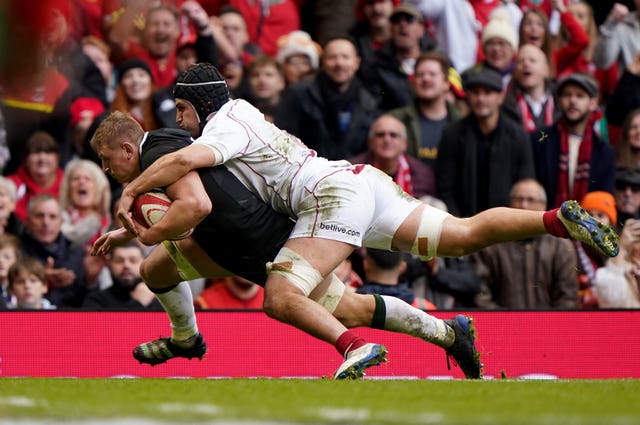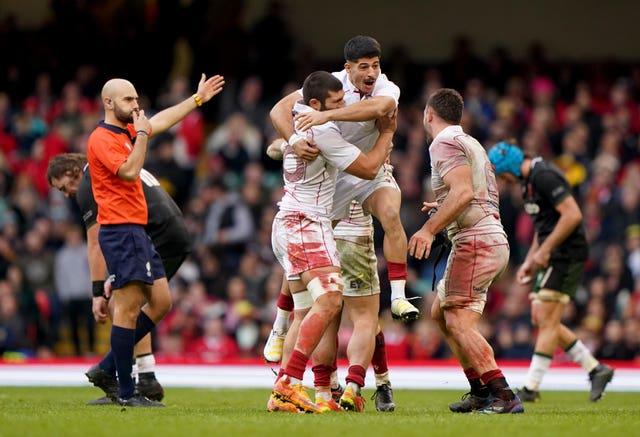
Wales suffered an embarrassing defeat as unfancied Georgia claimed a famous 13-12 Autumn Nations Series victory at the Principality Stadium.
Substitute Luka Matkava’s penalty two minutes from time inflicted immeasurable pain on Wales.
Flanker Jac Morgan scored two first-half tries, but Wales huffed and puffed during a miserable second 40 minutes that Georgia dominated.
The countries clash again at next year’s World Cup in France, which is an encounter that Georgia will not fear in any shape or form.
A historic win for @GeorgianRugby in Cardiff! 🇬🇪#WorldRugbyAwards pic.twitter.com/aa90sFyAVQ
— World Rugby (@WorldRugby) November 19, 2022
Wing Sandro Todua scored a 59th-minute try, while fly-half Tedo Abzhandadze converted and kicked a penalty as the visitors repeatedly shunted Wales into reverse gear.
He then missed a penalty, but Matkava came up trumps and Wales could have absolutely no complaints.
It was one of the greatest upsets in international rugby union history, and will inevitably pile pressure on Wales boss Wayne Pivac building towards next weekend’s autumn finale against Australia.
Scarlets back-row forward Josh Macleod made his Wales debut, packing down at number eight, while other changes from the team that beat Argentina last weekend included starts for Rhys Priestland, wing Josh Adams and lock Ben Carter.
Abzhandadze kicked Georgia into a second-minute lead, before full-back Davit Niniashvili sparked a thrilling counter-attack as the visitors settled impressively.
 Jac Morgan scored two tries for Wales (Joe Giddens/PA)
Jac Morgan scored two tries for Wales (Joe Giddens/PA)
Wales were slow out of the blocks in comparison, but they began to exert pressure inside Georgia’s 22, with wing Alex Cuthbert going close following two lineout drives that were defended well by the visitors.
But Wales pounced in the 20th minute after lock Adam Beard won lineout ball and flanker Morgan surged over for a try that Priestland converted, making it 7-3.
Morgan struck again just three minutes later when he collected scrum-half Tomos Williams’ pass, building impressively on his outstanding display against Argentina after going on as a first-half replacement.
Wales thought they had scored again eight minutes before the break when Adams finished impressively after a kick and chase, but Williams’ pass to him was ruled forward.
It was a let-off for Georgia, and they accrued no further damage on the scoreboard as Wales led 12-3 at half-time.
SGÔR TERFYNOL
🏴 12-13 🇬🇪#WelshRugby | #ANS pic.twitter.com/uxe0mBgWKU
— Welsh Rugby Union 🏴 (@WelshRugbyUnion) November 19, 2022
Pivac made a first change just five minutes into the second period, sending on prop Sam Wainwright for Dillon Lewis.
But Wales were temporarily reduced to 14 men when Cuthbert received a yellow card from referee Andrea Piardi following an aerial collision that saw Todua fall awkwardly.
Macleod then made way, with Taulupe Faletau taking over from him and making his 99th Test-match appearance for Wales and the British and Irish Lions.
Georgia dominated the third quarter, capitalising on aimless kicking from Wales, and scrum-half Vasil Lobzhanidze went close to a try that was thwarted by strong defensive work from Adams.
Wales were predictable, lacking creativity, and Georgia seemed to thrive on that.
 Sandro Mamamtavrishvili, left, Luka Matkava, centre, and Beka Saghinadze, right, celebrate victory (Joe Giddens/PA)
Sandro Mamamtavrishvili, left, Luka Matkava, centre, and Beka Saghinadze, right, celebrate victory (Joe Giddens/PA)
And they cut the deficit to just two points midway through the half when Todua collected a well-placed kick and crossed unopposed, with Abzhandadze’s conversion making it 12-10.
Abzhandadze had a chance to put Georgia ahead, but he drifted an angled penalty attempt wide and Wales escaped.
Faletau made a considerable impact, and he looked to have created a hat-trick try for Morgan, only for the Cardiff number eight to knock on during approach play.
The final few minutes were inevitably tense, especially from a Welsh perspective, and Matkava put Georgia in dreamland with his long-range penalty.
Georgia’s players celebrated wildly, and they held on to win, claiming the greatest victory in their rugby history, beating Wales for the first time and leaving their hosts crestfallen.


Comments: Our rules
We want our comments to be a lively and valuable part of our community - a place where readers can debate and engage with the most important local issues. The ability to comment on our stories is a privilege, not a right, however, and that privilege may be withdrawn if it is abused or misused.
Please report any comments that break our rules.
Read the rules here